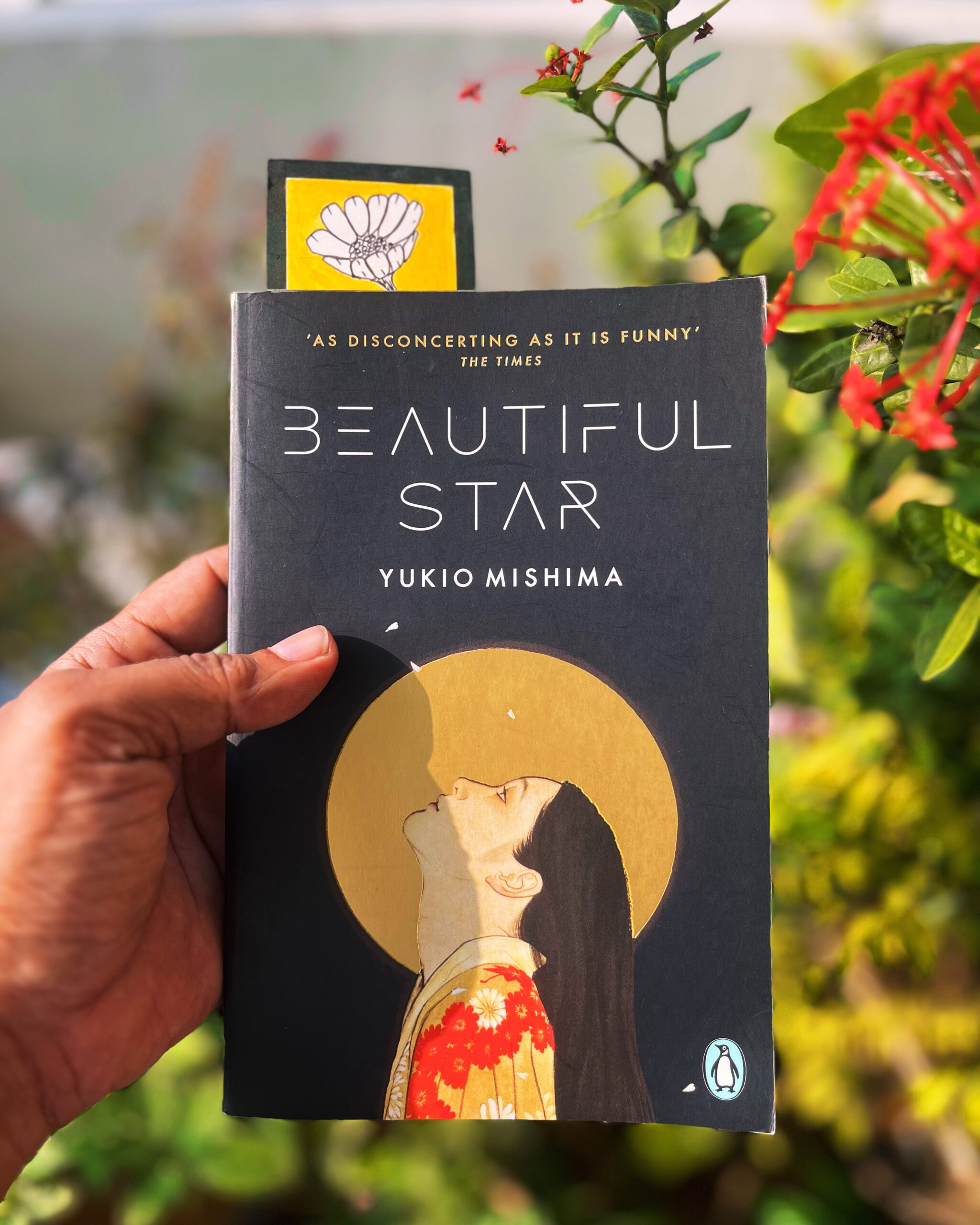
“Here sleeps the human species.
They ended up lying all the time,
They offered up flowers for both good and bad fortune, They often kept small birds,
They were frequently late getting to appointments
And they often laughed.
May they rest forever in eternal peace.”
Yukio Mishima’s Beautiful Star has a girl on its cover in a splattered red kimono looking up at the stars with a gold disc halo in the backdrop. The title of the book is designed in a beautiful futuristic typeface. It stood out on the shelf at Blossoms and I did not hesitate to pick it up not knowing what I was getting into. Despite the old adage, ‘Don’t judge a book by its cover,’ I could’nt resist the allure of beautiful cover art. And there is something about Japanese authors and their covers.
Mishima is usually known for writing about Japanese culture and tradition and held very strong views about society, consumerism, politics and culture. Things took a turn for the worse when he embraced ultra-nationalism and led a failed coup attempt, ultimately ending in his act of seppuku – the Japanese form of ritualistic suicide. Except this had more blood and gore than Kill Bill.
I am not certain if Beautiful Star falls in the genre of science-fiction with its flying saucers or UFO’s- imagined or delusional perhaps?
But it certainly makes one think with its mix of dark humour blended with layers of philosophy.
“Nazi concentration camps demonstrated that the only objective value of human beings is in the form of soap, brushes or, at best, lamp-shades. Not a single human being after death has ever been converted into something as useful as an electric fan.”
Beautiful Star is the story about a family who come to believe they are extra-terrestrial beings and have been placed on earth with a greater purpose- to prevent nuclear war and to save humanity from extermination. This book was written at the height of the cold war during the JFK stand-off with Khrushchev amidst the Cuban-missile crisis.
Through this black comedy Mishima raises questions about who we are and our role as humans. There is quite a bit of underlying humour which brings up a bizarre thought if Will Smith’s Men In Black premise was inspired from Beautiful Star. Maybe not.
“Nothing delights people more than to talk about people dying or being killed.”
Read in isolation, one could easily be led to think the comment is about Malayalam television news.
Beautiful Star acts as a conduit for social criticism.
On voyeurism-
“Imagine a traffic accident in which a young woman has fallen to the ground, exposing her thighs. It happens to be a rainy night, and the rain spatters onto the blood gushing from her thighs, making it seem that she is wearing vivacious red mesh tights.
And all the surrounding rubberneckers stare long and hard at the distressed human girl with a mixture of bewilderment and delight. They are all aware that her suffering is non-transmissible, that each of them shoulders the “conditions” of suffering in their individual way.”
On politics-
“Human politics involves forever making obscene allusions about the future, like flashing a woman’s thighs. Or dangling the bait of dreams, hopes and “something better”, just as you might dangle carrots in front of a horse’s muzzle.”
“If a political leader’s back teeth begin to ache in the midst of a great speech, and the teeth of tens of thousands in his audience begin to ache in the same way, it means trouble.”
“People tolerate the existence of heroes because they know that every hero defecates in the same manner as everyone else.”
I found myself at odds with my own thoughts, even as I agreed with him, with the realisation that much of what he said remains relevant even today.
On mob mentality-
“This is the most unnatural society in history. If only we set our minds to it, we could easily devise ways to incite people into sudden action.”
And a small point for Murakami fans. Mishima’s style and approach is really different. Murakami weaves the surreal into everyday life, offering an escape, while Mishima’s style is sharper and edgier. With Mishima, there’s no magical escape—just stark reality.

Leave a Reply